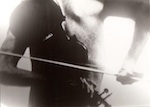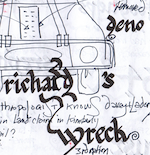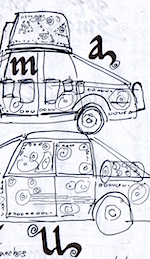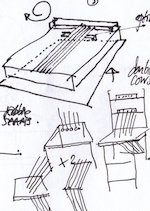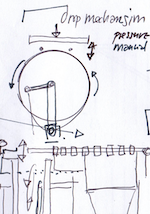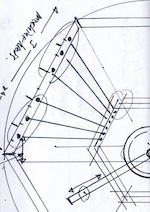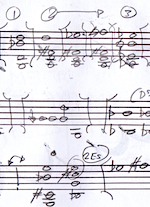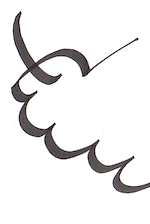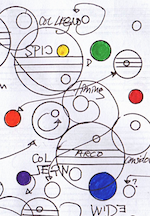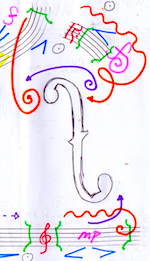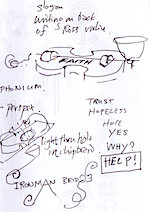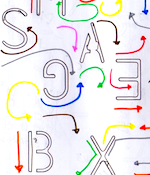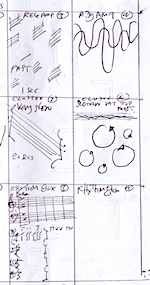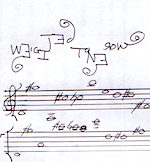 | |||||||
 |
Relative Violin Notebooks 2 2015-2018 |
|
'One Person Once' started to appear in various parts of the former metropolis written on broken infrastructure in indelible green dust, or sometimes aggressively in a postmodern chalk. There were rumblings of complaint as the populace belatedly started to live out their predicament. The amount of unrest, as might be expected, depended on the weather or the proximity of a beach. Initially the authorities were confused; was this an expression of harmless art or a demonstration of defiance by the masses? It was as inevitable as extinction. With the complicit knowledge of the many (the final count was 12 billion) collected in bunkers owned by the few, nobody had come up with a plan B should the unimaginable be simply imagined. The side effects of a harmless procedure like cryonic suspension had brought a traditional-style catastrophe upon the species. Concerned scientists collected the particles, which had a translucent quality-and that green-well, it had never been witnessed before, a cadmium green so psychedelic that not even the toxic salt lakes of Western Australian could compare. Within weeks, the entire memory banks of mankind had been turned to dust - almost biblical. With no receptacles or plastic bags, and no memory of how they had been invented, the central management had simply allowed the dust to blow freely hither/thither amongst the piles of stone axes. And where there are stone axes, there must be also the remains of a musical tradition. In the quarry, they had found Rosenberg, once an educated man but now sentenced to a life of un-knowingness. Nothing to be done about not knowingness - in the contemporary stasis, this had become a common state of affairs. Knee deep in dust, Rosenberg pondered the truth of clinging viscosity, which made the true hard surface of the quarry floor difficult to judge and his footing somewhat uncertain. This was a Heisenberg paradise (he recognised) as he stumbled around looking for suitable rocks. There were no shelves where the dust could collect, no sewers that could be choked, no carpet to be swept; it was not raining dust, and anyway an umbrella wasn't going to help because it had not yet been reinvented. A stone quarry filled with a shallow lake of green dust, an ex-violinist with time on his hands trying to make sense of it. Other problems would reveal themselves, but the most pressing issue was his cognitive ability, or lack thereof . . . Working with fine detail and the craftsmanship of a lost age, Rosenberg chipped away at his neo-classical stone moulding - actually Dorian in structure but with a touch of Gothic surrounds on the astragal. A beta gargoyle was slowly being revealed, liberated even. Chip chip. He was taking extra care with the supporting columns; Dorian required a precise thickening in mid-column, creating the sought after slightly pregnant optical illusion. Ha! Those Greeks, look at them now (he chuckled). A half thought registered. Am I supposed to not know that? (he questioned). They may have knowledged their Doric order set with the height at seven times the diameter of the base, but they had placed their columns directly on the floor without benefit of a pedestal. How stupid can the civilised get? You may not like gravity, but you can't avoid it (as he dropped his stone axe on his foot). Couldn't they have predicted falling columns and the disappearance of data? Still, they had known about proportion, about perspective, about power. Power was still useful. How many computers had he created since his release from cryonic suspension? It was an ethnological question: one, two, or many? Well... many. He looked down at his fingers to support this neurological discharge. If we had needed more fingers, wouldn't we have invented them (he surmised). Maybe his granulars did need a recharge. He chipped away for a few seconds more at the refined classical abacus that supported his new computer. A Dorian meisterwerk. It's coming along - no need to rush. He estimated his chip rate - was it one, two, or many? At just under 'many a minute', probably too high for a prisoner of conscience, the quarry manager had indicated. Many - the all-encompassing word that needed no justifier, intensifier, or number. The word had become stone, dust - mortified by its own self-recognition, a true selfie (he clicked). This algorithm will eventually perform one action, for one person, once. And once that one person is no more, then there is no further need for the computer, which will crumble into a small pile of stones from which it originated. He'd always struggled with machine logic (the temptation of the controller). What if there were two identical computers? Ach, such flights of fancy, better to keep a grip on reality (he told himself). There were other quarry inmates who could worry about that proposition. Besides, their chip rate was in single figures, two single figures to be exact. He was considered a master mason and wore his badge with pride. 'Many Minter', it stated; 'First Class'. The badge was also made of stone, tough flint, bad grammar, wrong vocabulary. If you tossed the badge along the floor, sparks flew. That's how fire had been invented just last week (he told himself). Up to that point, it had been freezing with the extreme cold of a dysfunctional memory. Just then a Gedanken popped into the Doctor's upper ganglier; the granulars started churning. What if the piano had never been invented? He didn't mean any of the chordophone precursors or lateral zithers like the dulcimer, cimbalom, koto, guzheng, or santur. He meant all those ivories that had come through the European tradition. Christoforte, what were you thinking? Even the harpsichord is not blameless. Without the piano, there would be no tortured counterpoint (the only true invention in his view) and none of that Mozak modulation nonsense where you end up in a different key but with the same intervallic relationships. He was thinking into oblivion the entire Western canon. He imagined the big Plonkathons that had echoed through the castles and cathedrals of Christendom. He turned his gaze and rendered to dust all that religiosity (that easy eh?) All right - even if you allowed the music through the grinder, there were still those God-awful cantata texts - all that coming (ich komme), all that blood. Luckily, he had forgotten most of his German. Rosenberg warmed himself on the ashes of classicism and musicologists who had found yet another forgettable, second-rate 18th-century hack court composer. As he focused the sun's rays through his eyeglass and onto the romantics, he smelt the smoke of sonata form contentment - conveniently sidestepping Beethoven. Aber ich bin Beethoven! yells some deranged detainee from the other side of the quarry. Ach, they all think they are Beethoven. No more stodgy Brahms, no tortured Schoenberg, and none of that mediocre pop music. You couldn't have ended up with all that music without the piano; it had been the musicologist's dream instrument. Apart from it being blindingly obvious where all the notes are and hence a reductionist's hammer taken to the basic principles of 'other' in music, the keyboard (for that is what it had come down to) haunted Rosenberg, who had lived long enough to see that 84 keys were an extravagance in passing (he blinked). The piano was clearly responsible for the computer - and Steve Jobs had been tone deaf (he noted). One keyboard click was what it now took to play the entire works of any sonic event ever heard by anyone at any time in any place, including the quarry where he was now working, building his final contribution - a one-stop shopping marvel to confound: the irreducible computational device made of stone. A chastened, bare-footed Rosenberg continued his contemplative labour. Here a chip, there a chip, everywhere a chip chip. The keyboard was the super paradigm of the Enlightenment. The Cartesian balloon sent aloft in the unlimited fresh air released with the decapitation of the French nobility and its gastronomic cake. What could be more damning than the simple elegance of a pianoforte - duality in abundance at the table of the bourgeois? The black keys could be white, and the white keys could be black. It didn't matter as long as there were two sets clearly demarcated for all to see and hear, all in their places with bright shining faces, (Rosenberg pondered between movements, his stone axe raised in anticipation). Occasionally, the quarry manager would call a production meeting with Rosenberg, for this was how it used to be. They would stare at each other, tacitly, each trying to remember the agenda. One time, the violinist thought he heard the sound of scribbling. Writing on stone tablets? Surely such a useful tool would have left a data trail as to its method and purpose? Every activity had left a trace, whether taking your dog for a walk, boiling an egg, or playing the violin. All begat data - data that had been generated, stored, sold, and then lost. But even the most effervescent of data with the lightest of footprints had needed a physical reality in which to exist. Electricity; the guilty conduit. Can you run me through that again? Coal, air (impossible to breath), power stations, rare earths... the manager of the quarry could not remember the rest. They continued to observe each other for many, many moments before mutually assuming (after an inadvertent movement of the head) that the meeting was over. Stoneberg - an extract from Rosenberg 3.0 - not violin music (the book). |
 |
